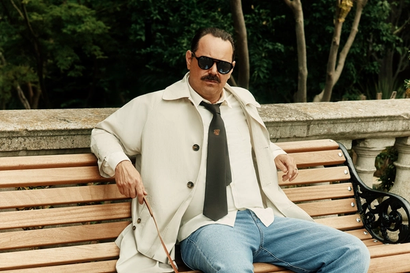

Words: Patrick Tillard
The Imitation Game is the first script that Benedict Cumberbatch ever remembers monitoring as it made its way into production. That, says the acclaimed actor, is a measure of just how important Alan Turing’s story was to him.
Q: How important was it to tell Alan Turing’s story?, A: Really important. I think Graham Moore’s great sleight of hand with this magnificent film is that it’s not a lumpy moment-by-moment biopic. You discover Alan at the height of his powers at Bletchley Park, and you don’t really know who he is, but you’re slightly intrigued by him, endeared by him, bemused by him, frustrated by him.
You realise that there’s some spark of brilliance in him. It’s surprising how little known he is. We know some of the headlines; or we, in England, know some of the headlines because it part of our history. But I think most people would agree there’s a massive disparity between his achievements and how much his story is known.
I hope [the film] entertains, amuses, thrills, terrifies, and upsets people, but ultimately I really hope it brings Alan Turing to a much wider audience. That’s what’s so important, because he’s a war hero, a gay icon, and the father of the computer age. It’s an incredible amount to achieve in 41 years.
Q: What lesson should we take from his story?, A: We should learn to celebrate our differences and seek out our similarities rather than create divisive fear. He’s a man who committed suicide because he was persecuted for his sexuality by the very democracy and government that he saved. It’s a sickening irony and the unbearable tragedy of this story.
The film also teaches us about what it is to be human and to love. It also shows us people being in service to governments and secrets. It’s about the continuing resonance of communication, and how important words are, how important it is to understand people and break down what the differences are between us, through dialogue, through any form of codified communication. It’s about a way of understanding, and it doesn’t matter if it’s a secret code or common English.
The thread through the whole film is the idea that Alan was a man who was the consummate learner, forever shaped by his experiences and the people who populated them. He experienced things before he understood them. His stutter, his introverted, slightly alienating, approach to work; his singular focus, humour and individualism – all of it was manufactured through his conditioning.
Q: How important was Turing’s affection for his school friend Christopher Morcom in creating this genius?, A: This affair that he had, although unconsummated, was a beautiful love story. It’s heart-breaking and doubly tragic because Christopher gave him the self-confidence to love and be a part of something outside of himself, and that object was then destroyed by this cruel disease, bovine tuberculosis.
The level of tragedy in that happening at such a formative moment I find heart-breaking in itself, but then to know what follows…
It’s amazing that as with all adversity in his life he used it for the positive. In those letters to Christopher’s grieving mother, Alan’s agnosticism forms and crystallises. He writes he doesn’t believe in a soul or spirit, but that he could keep Christopher’s legacy alive, by working as hard as he could to be as good as him, and to better himself because Christopher was better than him. That was where this singular work ethic was born in him. That’s what got him into Cambridge. That’s what brought this mind to the world. This tragic loss in his youth gave the world Alan Turing.
Q: Was it an instant ‘Yes’ from you?, A: YES!!! It was the only script I’ve ever ‘tracked’ – that Hollywood expression for monitoring something that’s lost in the hinterland of redevelopment. I heard about the script, because someone had mentioned it to me, saying, ‘You’d be great for that role’.
Q: How was working with Morten Tyldum?, A: He’s great, I love him to bits – he is a brilliant storyteller.
We called him ‘the honey monster’ on set, because he’s got this kind of ridiculous overcaffeinated energy, which is actually much needed on a very short shoot, trying to do something epic with a comparatively small budget. He gave very good and concise notes and we always had time to enjoy the whole filming process at some point in the day often thanks to him. He pushed hard but benignly and we can all take great pride in the result of our work thanks to him.
Q: Was it a difficult role?, A: Um… In some ways the importance of getting it right for Alan was difficult, as it should be. But I had a great team: from Sarah Shepherd, our dialect coach, to all the team of creatives and HOD’s. They were a great group who were all on board for all the right reasons. They did so much of the heavily lifting, and Graham’s script was such a delight that a lot of the film felt incredibly natural. Rehearsals with the blissful and extremely talented cast helped hugely too.
So, yes, it was a difficult role made easy by my co-workers I guess! The hardest aspect was the responsibility of getting it right for Alan’s legacy.
Q: Does it shock you that he is not a more celebrated figure?, A: Yes. I was shocked by how, relative to his achievements and what he endured, he is comparatively unknown. I know it wasn’t him alone. It was teams of scientists and technicians and ideas that were developed from Babbage and Ada Lovelace to the Polish cryptographers and beyond the war he worked with teams at Manchester too. But what he contributed was astonishing. He did write to Churchill. The whole thing of Bletchley Park just exploded exponentially, and he got the funding to mechanise the whole process. His work on the Bombe, his work on the Polish code-breaking machine, his adaptations – they were so sophisticated.
Q: What might Alan Turing have gone on to achieve, had his life not been cut short?, A: Alan was 41 in 1952. Let’s say that he might have lived until 80 or 90, because he was quite healthy and fit. Can you imagine what he might have achieved? The birth of the internet probably would have been sped up. Some say that his early work at Cambridge was his best work.
It’s hard to say as so much happened to him to debilitate his work in the later years. Who knows what a tolerant, permissive society, that celebrated him as someone who was different rather than punishing him for it, would have fostered in him? He was a unique human being and a unique contribution to our world. Who knows?
Q: Would you agree that Joan Clarke is another unsung hero in this story?, A: Absolutely. She deserves her own film. Keira is wonderful as Joan. A woman looking for a place at the table and equal pay, asking to be judged on her merits rather than her sex. Brilliant as she was and entitled to that as she was it was a battle. I think Keira shows how she had to navigate the institutionalised sexism with kindness effortlessly.
The Imitation Game is available on Blu-ray, DVD and digital platforms now, courtesy of StudioCanal.


